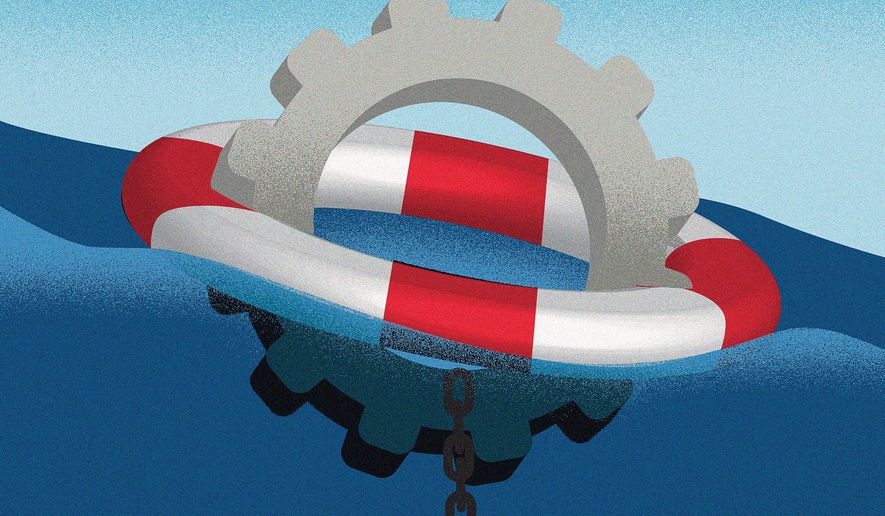OPINION:
If you’ve ever even claimed to care about limiting government spending, then you know things have gone significantly off the rails.
The U.S. government spent $4.5 trillion last year. It already has spent or committed more than that this year, and we are not yet out of April. It also has postponed Tax Day till July 15, which means that money sits in taxpayers’ accounts — and not the government’s — for three additional, expensive months.
Washington has decided to attempt to keep everyone afloat until the pandemic subsidies and economic activity can return. It has halted evictions and foreclosures, approved $1,200 direct payments to taxpayers and endorsed $355 billion in loans to small businesses that will be forgiven entirely if they keep their employees on the payroll through June.
These are adjunct safety nets cast widely to keep the maximum number of Americans solvent through the crisis. In this spirit, Congress must find a way to help multiemployer pension programs.
Multiemployer pension plans are how employers of union workers join together to fund their negotiated pension and retiree health benefits programs. There are about 1,400 of them, and they cover 10 million people, including more than 6 million retirees, with most in the building trades, manufacturing, mining, trucking and entertainment.
Multiemployer pension plans were in bad shape even before COVID-19 hit. Collectively, their assets amount to about 40 percent of their liabilities. Six plans collapsed in the last year, and eight others sought assistance from the Pension Benefit Guaranty Corp., the federal backstop to these plans, which is itself — along with several of the nation’s biggest plans — in danger of collapse within five years absent reform.
But now the country’s aging demographics, the coronavirus-related rapid decline of the stock market and dramatic drop in employment, have made the situation urgent. Congress took some steps in the CARES Act — the first round of COVID-19 economic relief – including a measure that allows companies to defer pension contributions and suspend benefits restrictions into next year.
But there is consensus more must be done. The heart of a relief package supported by House Speaker Nancy Pelosi, Senate Democrats and President Trump was stripped out of the first coronavirus relief bill at the behest of Senate Majority Mitch McConnell because Senate Republicans did not want to bail out union pension plans without providing safeguards to ensure the problem wouldn’t return in even bigger form.
A Republican plan, based on an earlier proposal put together by Sens. Charles Grassley, Iowa Republican, and Lamar Alexander, Tennessee Republican, would “partition” off the portions of plans that are in the worst shape and have the government pay their benefits through the Pension Benefit Guaranty Corp., leaving the healthier portions to pay for themselves.
It would require pension plans to pay premiums to the Pension Benefit Guaranty Corp. commensurate with the actual risk each plan entails, rather than the one-size-fits-all pricing model now in use. Those that pursue riskier strategies would pay more of the cost of insuring their plans going forward. This, in turn, would mean pension plans would have to more accurately report earnings expectations — another source of the present problem.
It also would be made available only to plans in the worst overall conditions and only those in “critical and declining” status as of enactment would be eligible.
Democrats want to include more plans and to make plans that fall into “critical and declining” status by 2024 eligible. It is less insistent on the accountability measures in the Grassley-Alexander plan.
Sticking points remain on how much to commit to this and on how to build safeguards into the plans so this doesn’t have to be revisited in the near future. Republican senators were said to have balked at the earlier proposal after the Congressional Budget Office reported that 25 percent of the plans that would’ve been covered under the proposal considered with the first CARES Act would’ve collapsed over time anyway.
There aren’t a lot of Republicans who came to Washington to bail out union pension plans. But even fewer came to take over paying union retiree and health benefits because those plans collapsed.
A deal is within reach here, and if it’s done right, it will be no worse than the dozens of other deals that are getting made in Washington to keep America afloat during the pandemic.
• Brian McNicoll, a freelance writer based in Alexandria, Virginia, is a former senior writer for The Heritage Foundation and former director of communications for the House Committee on Oversight and Government Reform.




Please read our comment policy before commenting.